For devotees and newcomers alike, the name Doctor Who conjures images of time-traveling adventures, quirky companions, and battles against bizarre foes. As the world celebrated fifty years of this iconic science-fiction saga, revisiting its modern genesis point, the 2005 episode Rose, becomes essential. This episode wasn’t just a revival; it was a gamble, a breath of fresh air tasked with re-introducing the Doctor to a 21st-century audience. The success of Rose paved the way for the enduring popularity the show enjoys today. But how well does this inaugural episode hold up, and what did it do to ensure the Doctor’s triumphant return? Let’s delve into Rose and understand why it remains a pivotal moment in Doctor Who history.
The weight on Rose‘s shoulders was immense. After years off-air, and numerous failed attempts to resurrect the Time Lord, bringing Doctor Who back in 2005 felt like a long shot. While dedicated fans kept the spirit alive through books and audio dramas, a successful television return seemed improbable. Russell T. Davies, known for his groundbreaking work on Queer as Folk and The Second Coming, might have appeared an unconventional choice as showrunner. Yet, his passion for Doctor Who and persistent campaigns since the late 90s ultimately led to this revival. Rose was the crucial first step, and the pressure to deliver was palpable.
Echoing the past, Rose cleverly borrows from Spearhead from Space, the 1970 story that launched the Third Doctor era. This connection is far from accidental; Spearhead marked a similarly seismic shift for Doctor Who, transitioning to color and a new format. Davies, recognizing the need for another bold reinvention, used Spearhead as a template, updating it for a contemporary audience. Both episodes introduce a recently regenerated Doctor arriving on Earth without a companion and feature the Autons as antagonists. This parallel provided a familiar yet fresh foundation for the revived series.
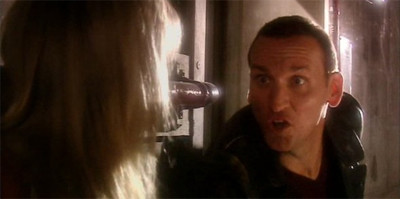 Christopher Eccleston as the Ninth Doctor beckons Rose Tyler to run in the Doctor Who episode "Rose".
Christopher Eccleston as the Ninth Doctor beckons Rose Tyler to run in the Doctor Who episode "Rose".
The return of the Autons in Rose was a masterstroke. These villains, essentially living plastic mannequins, strike a unique balance between the absurd and the genuinely unsettling. Their campy premise – shop dummies coming to life – is inherently ridiculous, yet their execution taps into the uncanny valley, creating a memorable and creepy threat. The Autons’ previous appearances, particularly in Terror of the Autons, had already cemented their place in Doctor Who lore, even drawing the ire of media watchdog Mary Whitehouse. In Rose, they effectively re-establish themselves as iconic monsters for a new generation.
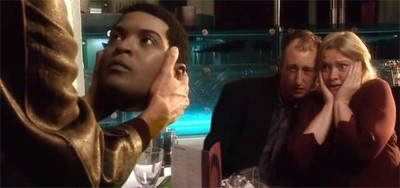 Auton hand bursts from a shop dummy's hand in a scene from Doctor Who "Rose", highlighting the campy horror of the villains.
Auton hand bursts from a shop dummy's hand in a scene from Doctor Who "Rose", highlighting the campy horror of the villains.
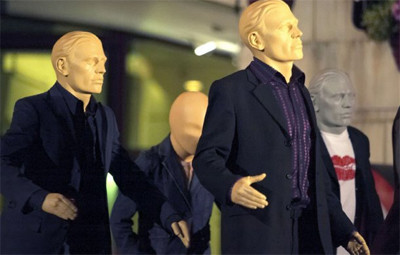 Rose Tyler and the Doctor confront Autons mannequins come to life in a tense moment from Doctor Who "Rose".
Rose Tyler and the Doctor confront Autons mannequins come to life in a tense moment from Doctor Who "Rose".
However, Rose isn’t without its imperfections. As a pilot episode finding its footing, it occasionally struggles with tonal consistency. Some moments lean too heavily into camp, like the infamous Auton hand scene, while others, such as the somewhat overstated CGI showcasing the London Eye transmitter, feel slightly clumsy. Similarly, Murray Gold’s score, while promising glimpses of his future brilliance, occasionally veers into overly synthesized territory, reflecting a series still developing its sonic identity.
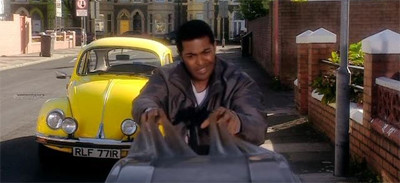 Close-up of a slightly melted Auton face in Doctor Who's "Rose", showing the blend of camp and unsettling visuals.
Close-up of a slightly melted Auton face in Doctor Who's "Rose", showing the blend of camp and unsettling visuals.
Russell T. Davies’ writing in Rose exemplifies both his strengths and weaknesses. His talent for character development shines brightly; within forty-five minutes, Rose, the Doctor, and even supporting characters like Mickey and Jackie Tyler feel remarkably well-defined. Davies excels at establishing compelling themes, hinting at the Doctor’s post-traumatic stress from the Time War and his deep affection for Earth, now implicitly his adopted home. However, his plotting, while energetic, can sometimes lack precision and rely on convenient coincidences. The Autons’ ambush of Mickey, for instance, raises questions about their broader invasion strategy.
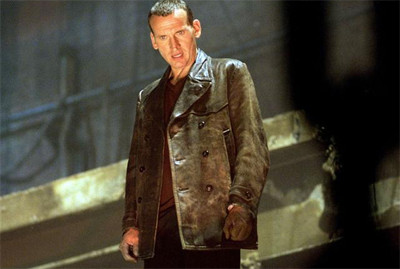 Christopher Eccleston as the Ninth Doctor with a questioning expression, pondering his new regeneration in "Rose".
Christopher Eccleston as the Ninth Doctor with a questioning expression, pondering his new regeneration in "Rose".
Christopher Eccleston’s Ninth Doctor is a revelation. He delivers a uniquely cynical and emotionally raw portrayal, distinctly different from previous incarnations. This Doctor is clearly burdened by the recent Time War, a conflict only hinted at in Rose, yet his underlying compassion for humanity remains evident. He’s sarcastic, even curt at times, but beneath the surface lies a romantic spirit and a profound weariness. This portrayal immediately establishes a Doctor grappling with inner turmoil, making him instantly compelling.
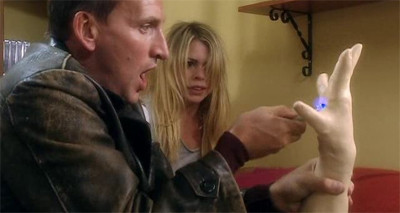 The Ninth Doctor observes events unfolding in "Rose", hinting at his detached yet caring nature.
The Ninth Doctor observes events unfolding in "Rose", hinting at his detached yet caring nature.
Crucially, Rose prioritizes character and thematic resonance over intricate exposition. The script avoids lengthy explanations of Time Lords or Gallifrey, opting instead to immerse the audience in the present drama. The Ninth Doctor’s recent regeneration is subtly implied, adding intrigue without overwhelming new viewers with backstory. This approach allows the episode to focus on establishing the Doctor’s personality and his relationship with Rose, the audience’s entry point into this revived world. The mystery surrounding the Doctor’s past and regeneration only deepens the viewer’s engagement.
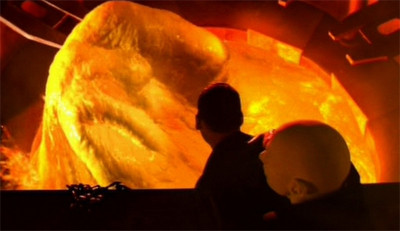 The Nestene Consciousness, a faceless alien entity, confronts the Doctor in Doctor Who "Rose".
The Nestene Consciousness, a faceless alien entity, confronts the Doctor in Doctor Who "Rose".
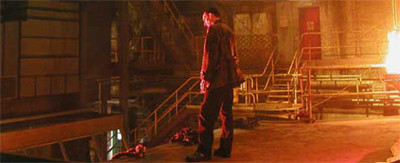 The Ninth Doctor wields his sonic screwdriver, ready for action in the revived Doctor Who episode "Rose".
The Ninth Doctor wields his sonic screwdriver, ready for action in the revived Doctor Who episode "Rose".
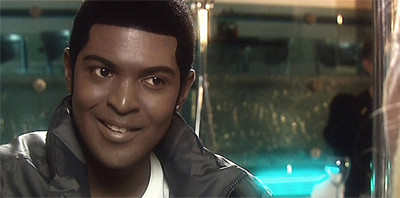 Mickey Smith, initially presented as Rose's neglectful boyfriend, in a scene from Doctor Who "Rose".
Mickey Smith, initially presented as Rose's neglectful boyfriend, in a scene from Doctor Who "Rose".
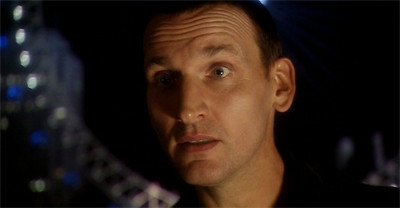 Rose Tyler expresses disbelief at discovering an alien base beneath the London Eye in Doctor Who "Rose".
Rose Tyler expresses disbelief at discovering an alien base beneath the London Eye in Doctor Who "Rose".
The climax of Rose unfolds beneath the London Eye, a brilliantly mundane yet iconic location. This setting perfectly encapsulates Doctor Who’s ability to find the extraordinary within the ordinary. The alien invasion headquarters hidden beneath a tourist attraction is both unsettling and grounded, a hallmark of the show’s enduring appeal. It echoes the classic series’ resourcefulness, utilizing everyday locations to create otherworldly scenarios.
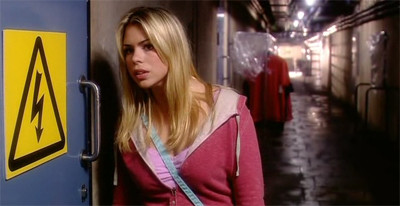 Rose Tyler confidently faces danger alongside the Doctor, showcasing her courage in "Rose".
Rose Tyler confidently faces danger alongside the Doctor, showcasing her courage in "Rose".
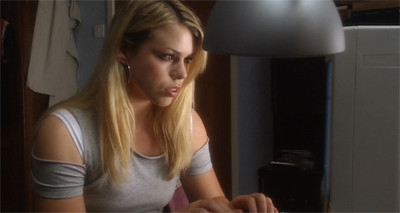 Billie Piper as Rose Tyler in Doctor Who "Rose", the episode named after her character.
Billie Piper as Rose Tyler in Doctor Who "Rose", the episode named after her character.
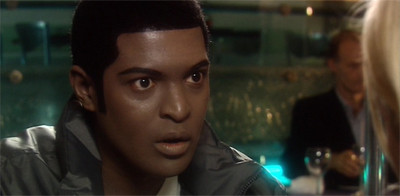 Autons stand menacingly in a shop window, ready to invade Earth in Doctor Who "Rose".
Autons stand menacingly in a shop window, ready to invade Earth in Doctor Who "Rose".
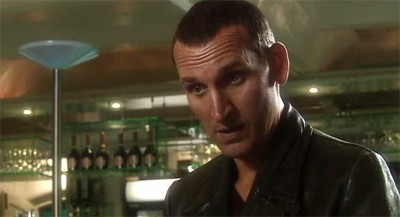 Christopher Eccleston's distinctive look as the Ninth Doctor in Doctor Who "Rose".
Christopher Eccleston's distinctive look as the Ninth Doctor in Doctor Who "Rose".
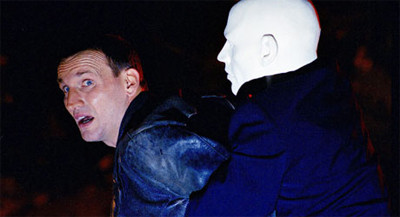 The Ninth Doctor fights off Autons, demonstrating his action-oriented approach in "Rose".
The Ninth Doctor fights off Autons, demonstrating his action-oriented approach in "Rose".
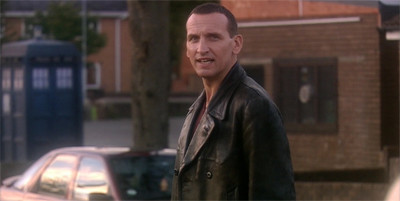 The Ninth Doctor dramatically arrives to save the day in a promotional image for Doctor Who "Rose".
The Ninth Doctor dramatically arrives to save the day in a promotional image for Doctor Who "Rose".
In conclusion, while Rose might not be the most polished episode of the revived Doctor Who, it serves as a remarkably effective launch. It successfully reintroduced the Doctor and his world to a new audience, balancing nostalgia with contemporary sensibilities. The episode’s focus on character, particularly the nuanced portrayal of the Ninth Doctor and the grounded introduction of Rose Tyler, proved to be a winning formula. Rose captured the essential spirit of Doctor Who – the wonder, the adventure, and the inherent humanity – ensuring its triumphant and enduring return to television screens. It’s a testament to the episode’s strength that it remains a beloved and crucial chapter in the ongoing saga of the Time Lord.

